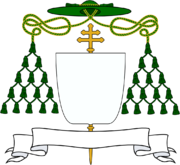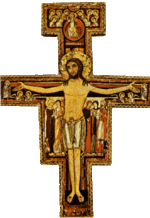Patriarch
Originally a patriarch was a man who exercised autocratic authority as a pater familias over an extended family. The system of such rule of families by senior males is called patriarchy. This is a Greek word, a composition of πατήρ (pater) meaning "father" and ἄρχων (archon) meaning "leader", "chief", "ruler", "king", etc.
Abraham, Isaac, and Jacob are referred to as the three patriarchs of the people of Israel, and the period in which they lived is called the Patriarchal Age. It originally acquired its religious meaning in the Septuagint version of the Bible.[1]
The word has mainly taken on specific ecclesiastical meanings. In particular, the highest-ranking bishops in Eastern Orthodoxy, Oriental Orthodoxy, the Roman Catholic Church (above Major Archbishop and primate), and the Assyrian Church of the East are called patriarchs. The office and ecclesiastical conscription (comprising one or more provinces, though outside his own (arch)diocese he is often without enforceable jurisdiction) of such a patriarch is called a patriarchate. Historically, a Patriarch may often be the logical choice to act as Ethnarch, representing the community that is identified with his religious confession within a state or empire of a different creed (as Christians within the Ottoman Empire).
Contents |
Eastern Christianity
Nestorianism
Patriarchs of the Church of the East, sometimes also referred to as Nestorian, the Church of Persia, the Sassanid Church, or, in modern times, the Assyrian Church of the East, trace their lineage of patriarchs back to the 1st century.
- The Catholicos-Patriarch of Seleucia-Ctesiphon, head of the Assyrian Church of the East
- The Patriarch of the Ancient Church of the East, a split from the Assyrian Church of the East
Eastern Orthodoxy
- The ancient Patriarchates, which originally also included and where equal in rank to the See of Rome:
- The Ecumenical Patriarch of Constantinople, head of the Orthodox Church of Constantinople and the Spiritual Leader of Eastern Orthodoxy
- The Patriarch of Alexandria and All Africa and the head of the Greek Orthodox Church of Alexandria
- The Patriarch of Antioch and the head of the Greek Orthodox Church of Antioch and All the East in the Near East
- The Patriarch of Jerusalem and the head of the Greek Orthodox Church of Jerusalem and Holy Zion in Israel, Palestine, Jordan and All Arabia
- The five junior Patriarchates created after the consolidation of the Pentarchy, in chronological order of their recognition as Patriarchates by the Ecumenical Patriarchate of Constantinople:
- The Patriarch of All Bulgaria and the head of the Bulgarian Orthodox Church in Bulgaria, recognized as a Patriarchate in 927[2]
- The Catholicos-Patriarch of All Georgia and the head of the Georgian Orthodox Church in Georgia, recognized as a Catholicate (Patriarchate) in 1008[3]
- The Serbian Patriarch and the head of the Serbian Orthodox Church in Serbia (and the former Yugoslavia), recognized as a Patriarchate in 1375[4]
- The Patriarch of Moscow and All Russia and the head of the Russian Orthodox Church in Russia, recognized as a Patriarchate in 1589[5]
- The Patriarch of All Romania and the head of the Romanian Orthodox Church in Romania, recognized as a Patriarchate in 1925[6]
Eastern Patriarchs out of the Orthodox Communion
- Patriarch of Moscow and All Russia head of the Russian Old-Orthodox Church
- Patriarch of Kiev head of the Ukrainian Orthodox Church - Kiev Patriarchate
- Patriarch of Kyiv and All Rus-Ukraine of the Ukrainian Autocephalous Orthodox Church Canonical
- Patriarch of the Catholic Apostolic Church of Antioch. A woman is sometimes elected as head of this Church, and when this happens her title is Matriarch instead. http://www.churchofantioch.org/coa/index.php?option=com_content&task=view&id=29&Itemid=45 (As this church accepts women as clergy, it is considered heretical by the Orthodox churches, as they hold that only males may be ordained.)
- Patriarch of the American Orthodox Catholic Church
- Patriarch of the Assembly of Jerusalem
Oriental Orthodox Churches
see: Oriental Orthodoxy
- The Pope of Alexandria and Patriarch of All Africa and the head of the Coptic Orthodox Church of Alexandria in Egypt and All Africa and the Spiritual Leader of Oriental Orthodoxy
- The Patriarch of Antioch and All the East and the head of the Syriac Orthodox Church of Antioch and Supreme Leader of the Universal Syriac Orthodox Church in the Near East
- The Catholicos of India and the head of the Malankara Jacobite Syriac Orthodox Church in India
- The Catholicos of Etchmiadzin, Armenia and of All Armenians and Supreme Patriarch of the Armenian Apostolic Church and the head of the Armenian Apostolic Church
- The Patriarch of Constantinople for the Armenians in Turkey
- The Patriarch of Jerusalem and of Holy Zion for the Armenians in Israel, Palestine, Jordan and the Persian Gulf
- The Catholicos of Cilicia and head of the Armenian Apostolic Church of the House of Cilicia in Antelias, Lebanon and the Middle East
- The Catholicos of the East and the head of the Indian Orthodox Church in India
- The Archbishop of Axum and Patriarch Catholicos of All Ethiopia and the head of the Ethiopian Orthodox Tewahedo Church in Ethiopia
- The Archbishop of Asmara and Patriarch of All Eritrea and the head of the Eritrean Orthodox Tewahedo Church in Eritrea
Roman Catholicism

As part of the Pentarchy, the Bishop of Rome was the only Patriarch in the Western Roman empire. It was roughly coterminous with present territory of the Latin Rite. In the past, Popes have used the title Patriarch of the West or Patriarch of Rome and All the West. However, this title was removed from a reference publication issued by the Vatican in 2006, although it was not abrogated.[7] The Orthodox, however, still believe that among the five Patriarchs and ancient Patriarchates (i.e., Rome, Constantinople, Antioch, Alexandria, and Jerusalem), a special place of honor belongs to the pope, a "primacy of honor," as "first among equals" and "Patriarch of the West," but not jurisdictional primacy or supremacy.[8]
Latin Rite
- The Latin Patriarch of Jerusalem
- The Patriarch of the East Indies a titular patriarchal see, united to Goa and Daman.
- The Patriarch of Lisbon
- The Patriarch of Venice
Patriarchs of the Eastern Catholic Churches
See: Patriarchs of the East, also see: Major archbishop - title equal to the Patriarch
- The Coptic Catholic Patriarch of Alexandria and head of the Coptic Catholic Church
- The Syrian Catholic Patriarch of Antioch and all the East and the head of the Syrian Catholic Church
- The Melkite Greek Catholic Patriarch of Antioch and all the East, of Alexandria, and of Jerusalem and the head of the Melkite Greek Catholic Church
- The Maronite Catholic Patriarch of Antioch and all the East, head of the Maronite Catholic Church
- The Chaldean Catholic Patriarch of Babylon and the head of the Chaldean Catholic Church
- The Armenian Catholic Patriarch of Cilicia and the head of the Armenian Catholic Church
Historical Latin Rite Patriarchs
- The Latin Patriarch of Antioch - Abolished in 1964
- The Latin Patriarch of Alexandria - Abolished in 1964
- The Patriarch of Aquileia - Dissolved in 1752
- The Latin Patriarch of Carthage - The title largely titular after the 7th century
- The Latin Patriarch of Constantinople - Abolished in 1964
- The Patriarch of Grado - In 1451 merged with the Bishopric of Castello and Venice to form the Archdiocese of Venice
- The Patriarch of the West Indies a titular patriarchal see, vacant since 1963
Catholic Patriarchs not in communion with the Church in Rome
- The Patriarch of the Catholic Apostolic National Church of Brazil
- The Patriarch of the International Communion of the Charismatic Episcopal Church
Mormonism
According to The Church of Jesus Christ of Latter-day Saints, a patriarch is one who has been ordained to the office of Patriarch in the Melchizedek Priesthood. The term is considered synonymous with the term evangelist. One of the patriarch's primary responsibilities is to give Patriarchal blessings, as Jacob did to his twelve sons in the Old Testament. Patriarchs are typically assigned in each stake and hold the title for life.
See also
- List of current Popes and Patriarchs
- Lists of Patriarchs
- Patriarchate
- Patriarchy
- Matriarchy
- List of Bishops and Archbishops
- Major archbishop
References
- ↑
 "Patriarch". Catholic Encyclopedia. New York: Robert Appleton Company. 1913.
"Patriarch". Catholic Encyclopedia. New York: Robert Appleton Company. 1913. - ↑ Catholic Near East Welfare Association, a Papal agency for humanitarian and pastoral support.
- ↑ Catholic Near East Welfare Association, a Papal agency for humanitarian and pastoral support.
- ↑ Catholic Near East Welfare Association, a Papal agency for humanitarian and pastoral support.
- ↑ Catholic Near East Welfare Association, a Papal agency for humanitarian and pastoral support.
- ↑ Catholic Near East Welfare Association, a Papal agency for humanitarian and pastoral support.
- ↑ Wooden, Cindy (2006-03-02). "Vatican removes title 'patriarch of the West' after pope's name". Catholic News Service.
- ↑ Timothy Ware, The Orthodox Church (London: Penguin Books, 1993), 27.
